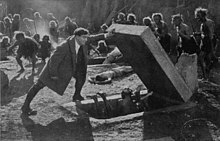| Maciste in Hell | |
|---|---|
 | |
| Maciste all'inferno | |
| Directed by | Guido Brignone |
| Screenplay by | Riccardo Artuffo and Stefano Pittaluga |
| Cinematography | Ubaldo Arata and Massimo Terzano |
Release date |
|
Running time | 95 minutes |
| Country | Italy |
| Language | silent |
Maciste all'inferno (Italian for "Maciste in Hell") is an Italian silent film directed by Guido Brignone published in 1925.